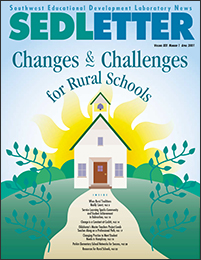Oklahoma's Master Teachers Project Leads Teacher Along a Professional Path
Cimarron Middle School math teacher Susan Powell is the kind of teacher you would like to see in every classroom. She is experienced, enthusiastic, and speaks warmly of her students. She frequently reflects on her practice and encourages others to do likewise. She was a recent finalist for the Presidential Awards for Excellence in Mathematics and Science Teaching, a competition funded by the National Science Foundation, and she is National Board Certified.
 | |
Powell says she owes her progress as a teacher and her National Board certification to her participation in the Oklahoma Master Teachers Project (MTP). "If I had not been involved in the Master Teachers Project, I would not have had a clue about how to go about getting the National Board Certification," admits Powell.
Powell became involved in the MTP because she was the only math teacher in a school of about 100 students, grades 5-8. "I needed help," she explains. "Although I had always individualized instruction, there were students that I felt I wasn't reaching. I was in a rural school and felt isolated. I am so much more connected to the world now."
Started in 1994 as a "training of trainers" with a select group of 15 math and science teachers, the Master Teachers Project was initially a cooperative effort between the Oklahoma State Department of Education and SEDL's Eisenhower Southwest Consortium for the Improvement of Mathematics and Science Teaching (SCIMAST). This year participation has grown to 38 teachers.
Sacra Nicholas, math coordinator for the project, says the program is one way the state department provides professional development for math and science teachers in Oklahoma with an emphasis on regional and local needs. Also it develops teacher leaders. Participants meet several times a year to reflect on their practice and learn new strategies for teaching and assessing math and science. In turn, they share what they have learned with colleagues in study groups and workshops.
Nicholas emphasizes that every study group is unique. "They focus on regional needs—they talk about topics important in their region of the state." Powell is energized by the study group she began. What she loves most is the participation of teachers from all grade levels. "I'm always looking for something else for our kids," Powell explains. "The math book is never enough." Teachers bring lesson plans to the study group meetings where they share their classroom successes and failures and conduct demonstrations. Email and the Internet make it easy for the group to share projects and Web sites with each other between meetings. Each summer, Powell and another MTP participant who is a science teacher conduct workshops for math and science teachers in northern Oklahoma.
An additional benefit of the local teachers coming together is the vertical alignment that often follows. As a middle school teacher, Powell observes it has been helpful to be able to talk to a high school math teacher about what the students will be learning in high school and what they need to know well before high school.
SEDL program associate Maria Torres, who worked with the MTP for nearly seven years, says the highlight of her tenure with the project was that each participant developed classroom-based alternative assessments linked to Oklahoma's state standards in math and science. These assessments were field-tested and have been used by the master teachers to coach colleagues on assessment and on connecting assessment and instruction.
Powell acknowledges that since her participation in MTP began, she has more thoroughly integrated assessment into her classes. "My students know they are going to have to reflect on what they have done in class, to write and talk about what they learned." Although Powell says her students have always done well when tested, she thinks increased assessment combined with the many inquiry-based activities that she has adopted, help students remember concepts and formulas much better than before. One such activity consists of constructing a cylinder and determining its area. Another, a student favorite each spring, is fantasy baseball. Using player statistics, students create a circle wheel for each player. They must be able to use ratios and proportions, decimals, and the degrees in a circle to complete the project.
Powell's work with the project gave her confidence to apply for the National Board Certification, a process that includes preparation of a portfolio featuring videotaped classroom sessions as well as teaching artifacts and student products. There is also a rigorous written exam. Powell sees the board certification as an extension of her professional development that completes what the MTP started. "I'm a better teacher because of having gone through the process," she says.
| >> Cochiti's Focus on Math Is Rewarded With Improved Scores For more information about National Board Certification, visit the Web site of the National Board of Professional Teaching Standards at http://www.nbpts.org. A section called "State and Local Action" provides information about the kind of support each state offers to teachers who wish to obtain certification. For example, Oklahoma helps pay the application fee for a certain number of applicants and provides certified teachers with an additional $5,000 a year for 10 years.
Source: The National Board for Professional Teaching Standards | ||||||||||||
Next Article: Changing Practice to Meet Student Needs in Humphrey

